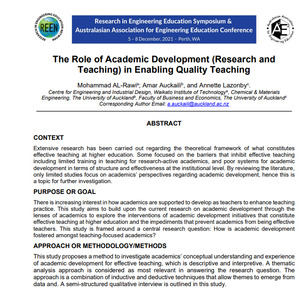Citation: UNSPECIFIED.
![[thumbnail of Abstract]](http://researcharchive.wintec.ac.nz/7848/1.hassmallThumbnailVersion/AAEE.png)

AAEE.png - Supplemental Material
Download (136kB) | Preview
Abstract
CONTEXT
Extensive research has been carried out regarding the theoretical framework of what constitutes effective teaching at higher education. Some focused on the barriers that inhibit effective teaching including limited training in teaching for research-active academics, and poor systems for academic development in terms of structure and effectiveness at the institutional level. By reviewing the literature,
only limited studies focus on academics’ perspectives regarding academic development, hence this is a topic for further investigation.
PURPOSE OR GOAL
There is increasing interest in how academics are supported to develop as teachers to enhance teaching practice. This study aims to build upon the current research on academic development through the lenses of academics to explore the interventions of academic development initiatives that constitute effective teaching at higher education and the impediments that prevent academics from being effective
teachers. This study is framed around a central research question: How is academic development fostered amongst teaching-focused academics?
APPROACH OR METHODOLOGY/METHODS
This study proposes a method to investigate academics’ conceptual understanding and experience of academic development for effective teaching, which is descriptive and interpretive. A thematic analysis approach is considered as most relevant in answering the research question. The
approach is a combination of inductive and deductive techniques that allow themes to emerge from data and. A semi-structured qualitative interview is outlined in this study.
ACTUAL OR ANTICIPATED OUTCOMES
For successful implementation of quality teaching,
universities must build a culture of quality research-informed teaching as a strategic direction that aligns with their policies and practices. It is encouraging
to find that universities are advocating for SoTL
intervention as part of their academic development
initiatives to enhance quality teaching and incentivising a research-focus amongst academic staff.
However, for those in teaching-only roles, there is a divergence between expectations and incentives around academic development: research is not formally required, but a research degree frequently is.
To maintain their academic identity and develop as an academic, teaching-only staff are still incentivised
to research. We aim to explore this divergence and how it affects teaching staff. It is imperative that institutional policies and practices position teaching as a separate but equal partner to research, and to explore how the institutional policy context shape research–teaching dynamics.
CONCLUSIONS/RECOMMENDATIONS/SUMMARY
Despite the reasonably straightforward theorisation of how academic development impacts on teaching and learning, it is challenging to monitor and evaluate this complex task due the scale and range of direct and indirect influences. However, to continue improving academic development initiatives, it is essential to monitor its progress. Monitoring quality teaching is an area that needs further investigation.
| Item Type: | Item presented at a conference, workshop or other event, and published in the proceedings |
|---|---|
| Uncontrolled Keywords: | Academic development, effective teaching, thematic analysis |
| Subjects: | T Technology > T Technology (General) |
| Divisions: | Schools > Centre for Engineering and Industrial Design |
| Depositing User: | Mohammad Al-Rawi |
| Date Deposited: | 18 Oct 2021 21:44 |
| Last Modified: | 21 Jul 2023 09:25 |
| URI: | http://researcharchive.wintec.ac.nz/id/eprint/7848 |

